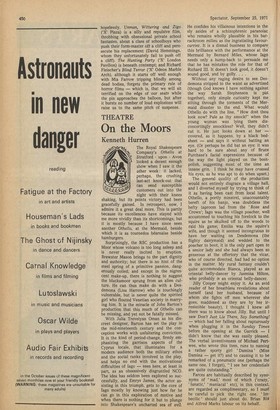THEATRE
On the Moors
Kenneth Hurren
The Royal Shakespeare Company's Othello at Stratford upon Avon looked a decent enough show when I saw it the other week : it lacked, perhaps, the crushing last-act knock-out that can send susceptible customers out into the night with their knees shaking, but its points victory had been gracefully gained. In retrospect, now, I admire it a great deal more. This is partly because its excellences have stayed with me more vividly than its shortcomings; but it is mostly because I have since seen another Othello, at the Mermaid, beside which it is as tournedos béarnaise beside hamburgers.
Surprisingly, the RSC production has a Moor whose volcano is too long asleep and is never really incited to eruption. Brewster Mason brings to the part dignity and authority; but there is no hint of the steel spring of a primitive passion, dangerously coiled; and except in the nigrescent make-up, there is nothing to suggest the blackamoor sprung from an alien culture. He can thus make do with a Desdemona (Lisa Harrow) who is touchingly vulnerable, but is never quite the spirited girl who flouted Venetian society in marrying him. It is the miracle of John Barton's production that this much of Othello can be missing, and yet not be fatally missed.
With Julia Trevelyan Oman as his discreet designer, Barton has set the play in the mid-nineteenth century and the conception works with unfaltering conviction. It is the kind of period-change, firmly emphasizing the garrison aspects of the Cyprus locale, that illuminates for a modern audience both the military ethos and the social ranks involved in the play, and helps no end with the motivational difficulties of Iago — seen here, at least in part, as an obsessively disgruntled NCO. The idea has seldom been explored so successfully, and Emrys James, the actor assisting in this triumph, gets to the core of Iago mostly by knowing just how far he can go in this exploration of motive and when there is nothing for it but to plunge into Shakespeare's uncharted sea of evil. He confides his villainous intentions in the sly asides of a schizophrenic paranoiac who remains wholly plausible in his bar rackroom milieu as the ingratiating favourcurrier. It is a dismal business to compare this brilliance with the performance at the Mermaid by Bernard Miles, whose Iago needs only a hump-back to persuade me that he has mistaken the role for that of Richard III. It doesn't look good, it doesn't sound good, and by golly. . . .
Without any raging desire to see Desdemona stripped to the waist as advertised (though God knows I have nothing against the way Sarah Stephenson is put together), only simple curiosity kept me sitting through the torments of the Mermaid disaster to the end. What would Othello do with the line. "How dost thou look now? Pale as thy smock!" when the young woman was lying there disconcertingly smockless? Well, they didn't cut it. He just looks down at her — covered, as it happens, by a black bedsheet — and says it without batting an eye. (Or perhaps he did bat an eye: it was hard to be sure about any of Bruce Purchase's facial expressions because of the way the light played on the bootpolish, suggesting most of the time an insane grin. I think he may have crossed his eyes, as he was apt to do when upset.) The general quality of the production would not entirely disgrace a village hall, and I diverted myself by trying to think of it as having been cast from local talent. Othello, a portly minstrel, unaccountably bereft of his banjo, was doubtless the hefty taproom lad from the 'Rose and Crown'; Iago was the village poacher, well accustomed to touching his forelock to the squire as he skulked off to the woods to raid his game; Emilia was the squire's wife, and though it seemed incongruous to have her waiting on Desdemona (the flighty dairymaid) and wedded to the poacher to boot, it is the only part open to a senior lady and she had always been so generous at the offertory that the vicar, who of course directed, had had no option in the matter. My rural fantasy couldn't quite accommodate Bianca, played as an oriental belly-dancer by Jasmina Hilton, who probably is an oriental belly-dancer.
Jilly Cooper might enjoy it. As an avid reader of her breathless revelations about herself (and her husband, because of whom she fights off men wherever she goes, maddened as they are by her irresistible beauty), I thought I knew all there was to know about Jilly. But until I saw Don't Just Lie There, Say Something! — which had her falling about rapturously when plugging it in the Sunday Times before the opening at the Garrick — didn't know that she was easily pleased. The verbal inventiveness of Michael Pertwee, who wrote this item, runs to naming a rather sporty girl ' Damina ' (Miss Damina — get it?) and to causing it to be remarked of a pneumatic one (perhaps the same one, I forget), "I see her credentials are quite outstanding."
Farces are habitually described by synonyms of 'mad,' most of which ('crazy,' 'lunatic,' maniacal ' etc), in this context, are regarded as complimentary, so I must be careful to pick the right one. ' Imbecilic' should just about do. Brian Rix and Alfred Marks labour on its behalf.


































 Previous page
Previous page